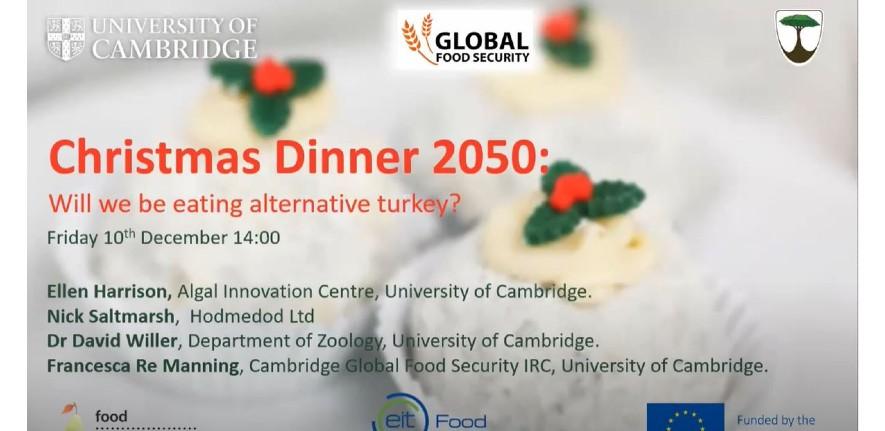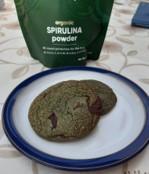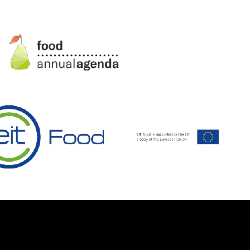
Submitted by K.L. Hlaba on Mon, 20/12/2021 - 13:08
Event Report and Recipe Suggestions (see below). You can find the recording of our event here.
Did you know that dried algae contain more protein than roast turkey (Britain’s traditional Christmas dish)? In fact, spirulina is one of the most concentrated foods on Earth; rich in protein and packed with amino acids, vitamins and minerals. So, will it be on the menu for Christmas dinner 2050?
This question was addressed at a webinar hosted by the University of Cambridge on Friday 10th December 2021. Chaired by Francesca Re Manning, Programme Manager of Cambridge Global Food Security, the panel looked at three alternative protein options: bivalve shellfish (mussels, clams etc.), algae and pulses.
Dr David Willer, who leads research into producing sustainable protein from bivalve shellfish, told us why they could be a contender. Clams and mussels contain more protein per calorie than beef. High in in fatty acids and a rich source of key micronutrients, they are also really sustainable; farming them uses up no land and no fresh water. Instead of polluting our eco-systems, they help act as fish nurseries and provide flood protection. They also compare quite favourably to other alternative meats like insects, having a better nutritional profile and lower environmental footprint.
Ellen Harrison, a PhD student at the University of Cambridge’s Algal Innovation Centre, outlined the nutritional advantages of algae, particularly as a source of vitamin B12, which is essential to human health but hard to find in a vegetarian or vegan diet. Algae’s credentials when it comes to sustainability are also impressive: it can be grown in salt water and it grows fast (in some cases 20 times faster than land plants). Algae is already used commercially as an egg replacement (e.g. in vegan mayonnaise). Dried algae can be added to a range of recipes to boost nutritional value; Ellen herself makes spirulina cookies which go down well with her colleagues and family! (See her recipe below.)
Nick Saltmarsh, co-founder of Hodmedod, talked about the history of beans and pulses in the British diet. In the past, for most people, because meat and dairy were luxury foods used in small quantities and reserved for special days, beans and pulses were our main source of protein and, as such, weren’t considered a food for feast-days. But Nick’s company, Hodmedod, hope to change this and get British-grown beans and pulses back onto people’s plates every day of the year. Not only are their products full of flavour, and a good source of environmentally-friendly protein, but they grow easily in the UK.
Having set out the case to change the menu at future feasts, the panel answered questions from the audience, received in advance and live. Topics raised included the sustainability of alternative proteins, compared to animal products; whether we can get the protein we need from crops we grow already and whether we can overcome perceptions among consumers that certain meat alternatives are unnatural.
Attendees were keen to know how to introduce more pulses into their diets. Karen Hlaba, from the University of Cambridge Department of Plant Sciences, has a useful perspective: ‘Pulses form a large part of my diet - primarily beans, chickpeas and lentils. I grew up on pulses, and as an adult I choose to eat them because I like the taste, the affordability, and because they help me to reduce the amount of simple carbohydrates and animal products in my diet. I do most of my grocery shopping at Aldi, Sainsbury and Tesco supermarkets, where I can easily find what I need. From my perspective, for individuals or families in the Cambridge area, eating alternative proteins is about choice, taste, nutritional knowledge, food culture, and affordability. It is not about lack of access.’
Finally the panel were asked to recommend recipes featuring alternative proteins. Attendees and others also chipped in some ideas:
Shellfish recipes from David Willer:
Stuffed Mushrooms With Clams Appetizer
Mussel Fritters
Cheesy Baked Mussels
Ellen Harrison’s Spirulina cookies:
I use this BBC good food recipe: Easy chocolate chip cookies and switch out 20g of the flour for 20g of Spirulina. So, it's 160g plain flour and 20g spirulina powder.
Ideas from Hodmedod:
British Dal Makhani - Hodmedod's British Wholefoods (hodmedods.co.uk)
Ginger Fox Cake - made with Carlin Peas - Hodmedod's British Wholefoods (hodmedods.co.uk)
Francesca Re Manning’s thoughts:
This is a good website: Healthy, Plant-Powered, Whole Food Recipes | Feasting At Home with lots of amazing recipes with plenty of options using pulses.
Winter recipes from Karen Hlaba:
Kidney bean curry
South African samp and beans (Samp are roughly milled white maize kernels, outside South Africa they can be purchased online or in specialty shops.)
Indulgent Christmas veggie/vegan recipes from Emma Garnett:
Vegan Christmas pumpkin recipe
Festive squash jalousie
Jack Munroe's nut roast
Jamie's vegan gravy
Chestnut and red wine casserole
Further information about our panel:
Dr David Willer, Research Fellow, Department of Zoology, University of Cambridge.
Dr Willer leads research projects to find new, efficient ways to produce sustainable protein from bivalve shellfish, and identify mechanisms to increase consumer uptake of this nutritious food. You can read more about his research here.
Ellen Harrison, PhD student, Algal Innovation Centre, University of Cambridge.
Ellen researches ways to use microalgae to produce sustainable and nutritious food and feed products.
Nick Saltmarsh, Co-founder, Hodmedod Ltd.
Hodmedod is an independent business working with a network of British farmers to sell a range of plant-based wholefoods from dried pulses, grains, seeds, flaked cereals and flour to canned and roasted beans and peas.
This event was part of the Cambridge Global Food Security IRC Coffee Break seminar series, organised with #AnnualFoodAgenda, powered by EIT Food, supported by the EIT, a body of the European Union, in association with CambPlants.





